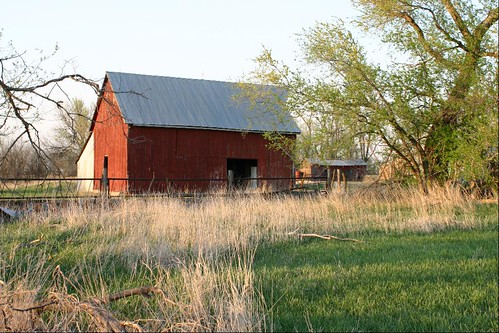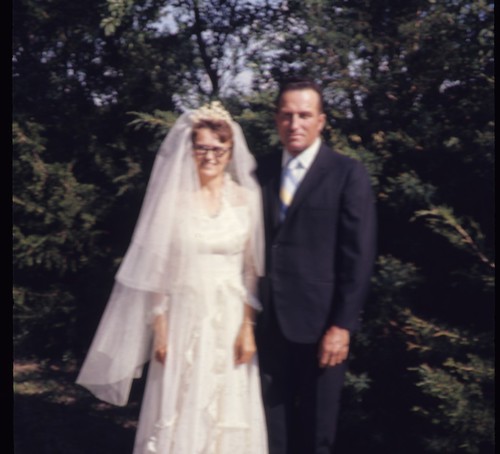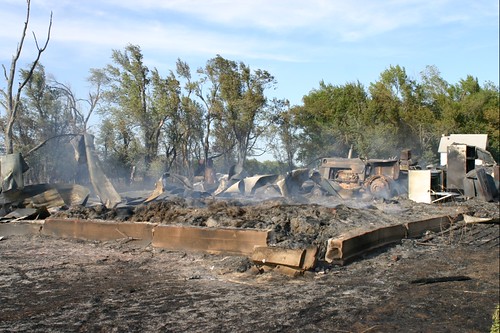
About 80 years ago, a Kansas family -- the Janzens -- built this barn.
About 60 years ago, my grandparents moved onto the farm. Their cattle were kept right here. I remember Grandpa's red tractor being parked in the barn.
So many memories have this barn in the background. We
had a visit from one of the Janzens that lived here as a child. He had fond memories of this building. My dad and his siblings once played in the deep snow in front of this barn.
Here's one memory from those times:

That's my grandma and grandpa on their 25th anniversary in 1970. It was a working barn back then, so they probably weren't standing right next to it for this picture, if you get my drift. But they were on the yard.
About 25 years ago, Grandma lost her battle with cancer. At some point or another, Grandpa had eased out of farming, so the barn had a lot less activity. I remember exploring his outbuildings when I got bored at family gatherings. And I used to mow the lawn next to it every summer when Grandpa went off to be a cook at a camp. I didn't mind mowing next to the barn. But I always tried to go past one corner of the house as fast as I could, because there were wasp and hornet nests right there.
About 7 years ago, it was time for Grandpa to move off the farm. It was getting to be too much to keep up the old house, the barn, the yard, and deal with things like freezing water pipes and water getting in through the windows. He moved to an independent-living duplex in town. He was always worried about what would happen to the farm. Over the next few years, the farm would sometimes be vacant, sometimes have renters. Some renters did some work on the house, but the barn sat. Grandpa would eventually move into the nursing home because of his Parkinson's.
Two and a half years ago, Grandpa
passed away. I shared
some memories from Grandpa's place at the funeral.
But what of the house, the farm now? Renters went, and it sat empty. Nothing was in great shape, and the house needed a lot of work. Perhaps the whole place would be leveled and turned back into the prairie that it once was, or used as farmland. Perhaps someone would have an interest someday.
A year and a half ago,
Jacob was on the way. Terah and I had occasionally thought of buying Grandpa's place, but we never talked about it seriously. We figured that we better finally decide what we're doing, before we have a baby around, or a child in school. So in April 2006, we went out to the farm and checked it out. The picture at the top of this post is from that visit. Terah and I checked out the house, the barns, the granary, the pasture, and the creek. As we walked past one of the barns, a pigeon flew out. Terah jumped with a shout. I grew up around barns and didn't really notice it. In the big red barn, besides Grandpa's tractor, we found some remnants from years ago: some old bales, corn cobs that raccoons had found long ago, several generations of electric fencers, old appliances.
And we
decided to go for it and buy the farm. This was right at a year after Grandpa died.
The family always liked to get together for Easter. What would happen for 2006? Well, they decided to have a picnic out at the farm. It was vacant, and a bit eerie. Yet they knew that we were working on buying the place and moving in. All but one took a last look through the house before our renovations began. The one person who didn't was my great aunt, Grandma's sister. She said, "I haven't been in this house for years. I remember how it looked back then. I don't want to remember how it looks now, run down like this. So I'm not going in. But once you have it all fixed up, THEN I'll go in!"
In June of 2006, we bought the farm.
One month later, we lost this barn, and two other buildings, to a
fire at our yard. This is what the beautiful red barn looked like that sad afternoon last year:

As I wrote back then, nobody got hurt, the barn was insured, but "somehow, despite all these things, it still feels like we lost a little bit of Grandpa today."
2006 was a hot, dry summer. We had a patch of debris, then a patch of dirt, where the barn once stood.
7 months ago, Terah, Jacob, and I moved out to the farm. For the first time in 80 years, someone could stand in the farmhouse in the evening, look to the west, and see the colorful Kansas sunset over the pasture; the trees down by the creek; and even the neighbor's barn off in the distance. It was a beautiful sight, but it was also sad; that's not the view we had expected.
But then a surprise. This spring and summer, plants started coming up where none had grown for 80 years. But only where this barn stood -- not where the other two buildings were.
We watched as they grew tall. I'm sure decades of animals hanging out there were well appreciated by the plants.
As they grew, it looked like we might be seeing Terah's favorite flower: wild Kansas sunflowers.
And sure enough, they were.
Last weekend, Terah, Jacob, and I went out to the old barn. I took some pictures of its new appearance.

This one stands where Grandpa's tractor used to be parked.

And here we see a lifetime of flowers, from the old and withering, to the young just about ready to bloom.

At the edge of the sunflowers, there's an old plow next to them. Though you might think it's barn-colored.

Animals continue to be attracted to the area. Here's one of the smaller visitors.

And here's a picture of almost the whole patch, right where the barn used to stand. I still mow right up to it.
I still miss the old barn. But somehow it still seems to be full of surprises and worth exploring. I wonder what next year will bring.
And I wonder if, a few years from now, Jacob will tell his friends about mowing right up to the sunflower patch, going fast to try to avoid any trouble with the bees.
 Sorry, ever since Debconf I've been busy, ill and otherwise
distracted. I'm still catching up... Stuff that's happened:
Dude, you're married! For the second year running,
I had to leave Debconf a day early to attend a wedding party. My good
friend Matthew married Oxana last Monday. I've just put my photos of the
happy event online today.
After a successful Debconf where I managed to evade the normal
plague, it hit hard on the Tuesday morning and I've been struggling
with it ever since. Just about over it now, but I've
been feeling crap for over a week.
On the way to Buenos Aires to catch my flight back to England, I
received a text message telling me the sad news that my uncle, John
Bolton had passed away. This means that the eldest two of my mum's
three brothers have died this year, in the space of just a few months,
and it's been a very hard time for the family. The funeral happened
earlier this week, so I was away and mostly off-line for a couple of
days travelling there and back.
I'm trying to get back up to speed on a whole host of different
things at the moment; if you're waiting on a response from me about
Debian-related stuff, please feel free to prod me via email or
IRC.
Sorry, ever since Debconf I've been busy, ill and otherwise
distracted. I'm still catching up... Stuff that's happened:
Dude, you're married! For the second year running,
I had to leave Debconf a day early to attend a wedding party. My good
friend Matthew married Oxana last Monday. I've just put my photos of the
happy event online today.
After a successful Debconf where I managed to evade the normal
plague, it hit hard on the Tuesday morning and I've been struggling
with it ever since. Just about over it now, but I've
been feeling crap for over a week.
On the way to Buenos Aires to catch my flight back to England, I
received a text message telling me the sad news that my uncle, John
Bolton had passed away. This means that the eldest two of my mum's
three brothers have died this year, in the space of just a few months,
and it's been a very hard time for the family. The funeral happened
earlier this week, so I was away and mostly off-line for a couple of
days travelling there and back.
I'm trying to get back up to speed on a whole host of different
things at the moment; if you're waiting on a response from me about
Debian-related stuff, please feel free to prod me via email or
IRC.
 Sarah's Mum arrived this morning.
Sarah was discharged from hospital this afternoon.
By some freaky coincidence, one of our friends from Australia who's been
through the same thing as us happened to be nearby, and rearranged his
travel plans to swing by and spend a day with us on the way home. I'm
extremely grateful for that.
The flowers, emails, and number of visitors we've received in the past four
days has been nothing short of overwhelming. We are truly grateful for
having so many wonderful friends over here (and all around the world). It's
going to take some time, but we'll acknowledge all of them.
This afternoon I signed the paperwork to have Joshua cremated. We've decided
against having any sort of funeral service.
The house looks like a bomb hit it, and then a florist moved in. I've barely
been home all week, and the fridge is still overflowing with leftovers from
last week's baby shower barbecue that we had. I guess I know what I'm doing
tomorrow...
Next, we need to pack up the baby's room.
Sarah's Mum arrived this morning.
Sarah was discharged from hospital this afternoon.
By some freaky coincidence, one of our friends from Australia who's been
through the same thing as us happened to be nearby, and rearranged his
travel plans to swing by and spend a day with us on the way home. I'm
extremely grateful for that.
The flowers, emails, and number of visitors we've received in the past four
days has been nothing short of overwhelming. We are truly grateful for
having so many wonderful friends over here (and all around the world). It's
going to take some time, but we'll acknowledge all of them.
This afternoon I signed the paperwork to have Joshua cremated. We've decided
against having any sort of funeral service.
The house looks like a bomb hit it, and then a florist moved in. I've barely
been home all week, and the fridge is still overflowing with leftovers from
last week's baby shower barbecue that we had. I guess I know what I'm doing
tomorrow...
Next, we need to pack up the baby's room.








![[pic of agm chair]](http://mjr.towers.org.uk/blog/2007/tcgagmchair.jpg) The question-and-answer session
was pretty interesting.
All of the questions were submitted in writing.
Some of them were submitted in advance and
others during the lunch break.
No spoken questions were taken and most
Insurance (CIS) and Bank questions were held back because
no-one from financial services was there.
The answers were grouped under a few
headings.
The question-and-answer session
was pretty interesting.
All of the questions were submitted in writing.
Some of them were submitted in advance and
others during the lunch break.
No spoken questions were taken and most
Insurance (CIS) and Bank questions were held back because
no-one from financial services was there.
The answers were grouped under a few
headings.



